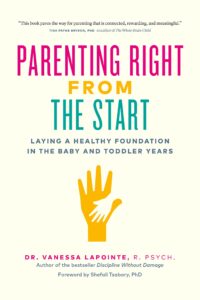Parenting Right From the Start by Dr. Vanessa Lapointe (Book Excerpt)
This has been adapted from Parenting Right From the Start: Laying a Healthy Foundation in the Baby and Toddler Years, 2019 by Dr. Vanessa Lapointe. Published by LifeTree Media.
 Your Family History
Your Family History
Though the first source of parental programming is inadvertently passed on by our parents, a second major source comes from generations past via our genes. The collective history of our ancestors is transmitted down the family line through our DNA. The science of epigenetics has revealed that it isn’t purely your DNA sequence that determines the expression of those genes. Rather, the conditions around you can turn on or heighten the expression of some genes while turning off or suppressing the expression of others. In this way, experiences—including traumatic ones—are encoded in the body at the cellular level.
The influence of traumatic experiences can be genetically traced through several generations. Psychologist and author Mark Wolynn describes this transmission of trauma powerfully through stories of his clients with family members who died in or lived through the Holocaust, as well as clients who have grandparents, aunts, uncles, or even more distant relatives who experienced the death of a child or witnessed terrible violence or any other perceived trauma. He provides a thorough and accessible scientific account of how this occurs in his book It Didn’t Start with You.
Take a moment to consider this: females are born with all the eggs they will reproduce from and more. That means that a female’s genetic material was inside of her grandmother at the time her mother’s conception, and so on down the line. Given the process of epigenetics, this means that a woman’s cells may carry the experiences of her grandmother at a cellular level. For males (who produce new sperm across their lifetime), the link will be stronger with their biological fathers and what was happening in that father’s life at the time of the son’s conception. However, men and women can inherit genetically coded trauma from either or both of their parents, and hence from either or both of their paternal and maternal lines.
The case histories around intergenerational trauma are eye opening and numerous. My great-grandmother was separated from her Indigenous tribe when she married a European settler who had come to Canada in pursuit of a better life. After she married, she lost her connection to her people, her village, her community. She gave life to seven children, but sadly she suffered from numerous mental breakdowns until eventually she ended up in an asylum, where she lived until her death. Her young children were farmed out to relatives and orphanages upon her institutionalization, and they endured their own challenging and traumatic experiences.
Time marched on. I came into the world and proceeded to have a fairly typical childhood. My parents eventually divorced. I went on to marry and have my own children, and then I also divorced. During my divorce, I became consumed with the idea of “losing” my children. I wasn’t worried that I would lose my children to the child welfare system—there was never any question of that—but moment by moment, issue by issue, as my boys’ father and I navigated the first year or two of separation and divorce, I was paralyzed by a single thought: What if they choose their dad over me?
Why was I thinking this? As a child psychologist, I am supposed to be attuned to these types of misperceptions. But even my years of education and experience were no match for genetics. I felt angst over potentially losing my children because the loss of my family system is encoded in my DNA. No matter what is truly happening in my life, I will feel this loss at some level of my consciousness, and will look for ways that this trauma is “real” in my life’s circumstances. Knowing the story of my ancestral roots and being aware of the influence of genetically inherited family trauma, I was able to piece together this understanding relatively early on. It was oddly comforting to be able to make sense of my fears in this way, and freeing to know that in the simple act of making the link, I was resolving the issue. I have worked within my own therapeutic process to deepen this resolution and bring a sense of peace into my life instead of fear.
The inheritance of family trauma through DNA is something anyone can experience. Almost always, it involves the replaying of unprocessed trauma—abuse, deaths, scandals, and/or losses that were never talked about, that may have been forbidden topics of conversation, or were buried deep in the skeleton closet. The entire spectacular reality, as Wolynn so aptly details, is a subconscious program coded in your genes. It isn’t anything you have done specifically, although if you are reliving family trauma you will likely feel wholly responsible for it. Sometimes inherited family trauma is discernible because of its peculiar and sudden onset, such as the young man who suddenly started having panic attacks after his twenty-first birthday, the age at which his grandfather was wounded in battle during the Second World War. Other times it will play out and continue to manifest in seemingly mysterious ways, and only when the family’s historical puzzle is pieced together will what is truly happening become obvious. Major life changes, milestone birthdays, and other notable happenings can often trigger the replaying of a family trauma story.
Becoming a parent is certainly a major life change—and, not surprisingly, even this happy event can be the gateway to the reliving of family trauma. This may be because much of what people historically experience as traumatic within their families often involves children. It’s not that children experience traumatic things more often than adults; rather, it’s that when bad things happen to kids it tends to be more traumatic than when bad things happen to adults. Trauma has a more devastating impact on children because their brains are not yet developed enough to safeguard them against the effects. The traumatic experience then becomes the organizing force of the young, developing brain (rather than being processed and buffered by the mature brain of an adult). As a result, childhood trauma can have significant and lasting effects. A parent who carries trauma from their own childhood can be triggered when their own child reaches the same life stage at which the trauma was experienced.
Although trauma can be genetically transmitted from one generation to the next, that does not mean there is no escape. The same cellular process that transmits family trauma contains the potential for healing it. Any individual can retroactively process their family’s historical experiences to effect real change in their own lives, and in the lives of the entire family system, so that their children will never suffer the same way. Occasionally, with self-reflection, people can accomplish this on their own. More often, especially with deep programs that are having a large impact on an individual’s life, reprocessing and healing will require the support of a trained coach, therapist, or healer.
Let’s be real for a moment. I write parenting books and counsel parents and kids, but I needed someone to guide me. I couldn’t believe that my unconscious mind was running the show. I was reliving old patterns until my counsellor and teacher pointed them out—and then I couldn’t stop seeing them. My counsellor introduced me to modalities I’d never heard of. Some included talk therapy; others worked to bring my subconscious mind in line with my conscious mind. For example: I am a child psychologist and a fierce mama; I know that I am awesome and my kids are lucky to have me. Yet when they went to their father’s house for a night, I worried they were going to leave me. I tried to talk myself out of this thought but to no avail. My subconscious mind believed this, and my conscious mind doesn’t give the orders. My counsellor directed me to a subconscious “healer” who helped me absorb the statement, “My kids will never leave me” until I felt an internal shift. The worry still comes up, but I am able to tend to it now; the walls are no longer crashing down on me.
I also looked for a village of people who would support my personal development. Thankfully, my counsellor had already created one. Every week, she holds a circle filled with people who are facing the challenges raised by their marriages, their children, other relationships, their finances, and their health. They are challenged by the same things I am, and I heal through witnessing their work. When I am challenged by life and stuck in blame and unable to find the opportunity for growth, I can put up my hand and ask for help. When I am not at circle, I can call any of these people at any time to make sense of what is going on for me. I have created an entirely new village to help me grow myself up while I grow up my children.
 About the Author
About the Author
VANESSA LAPOINTE is an author, parenting expert, and registered psychologist who has been supporting families and children for more than fifteen years. The bestselling author of Discipline Without Damage: How to Get Your Kids to Behave Without Messing Them Up and Parenting Right From The Start: Laying a Healthy Foundation in the Baby and Toddler Years, Lapointe is also a regularly invited media guest and contributor, educator and speaker and consultant to research projects and organizations promoting emotional health and development. Dr. Vanessa Lapointe is known for bringing a sense of nurturing understanding and humanity to all of her work. She presently works in private practice and has previous experience in a variety of settings, including the British Columbia Ministry of Children and Family Development and school systems.
Tags: baby, children's growth, dr. vanessa lapointe, family history, fatherhood, having kids, motherhood, parenting right from the start, raising a family, toddler years















